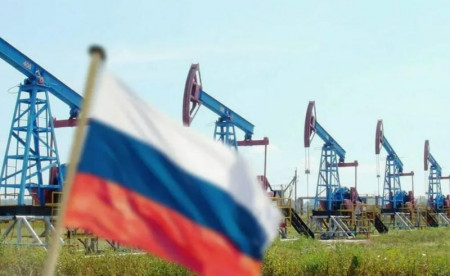
The Russian oil and gas industry has demonstrated truly convincing results in 2024, despite all the external challenges, primarily sanctions. Volatile price conditions and limited "black gold" output over OPEC+ obligations also had major impact on the industry's performance last year. Despite the variety of challenges and amid tougher sanctions, Russia kept increasing oil supplies to China and India. Gas exports to Asia via the Power of Siberia pipeline were also growing consistently to reach maximum daily levels ahead of schedule. Besides, Europe proceeded with purchasing Russian gas, both piped and LNG. Gazprom chief Alexey Miller noted that the company's annual production growth exceeded 60 billion cubic meters as compared to 2023 targets. Quite an impressive raise, indeed. National gas exports increased as well, but not that significantly. On the other hand, domestic gas consumption was up owing to both industrial consumers and the rapidly growing number of households under the social gasification program. In turn, oil companies somewhat slowed down in drilling new wells — an alarming signal — because of technological sanctions and self-restrictions committed within the OPEC+ deal. But adaptation algorithms are being improved all the way down as the percentage of implementing import substitution programs is on the rise in the industry. Thus, the period from January to November 2024 witnessed Russian oil companies reduce the number of new commissioned oil wells by more than 12 percent against the same period in 2023. This follows from data provided by business media familiar with Russian Energy Ministry statistics. According to their summary, 6.96 thousand new wells were launched in the country throughout the mentioned period. Tatneft showed the largest drop among major players — by 1.7 times to 693. LUKOIL commissioned 21.9 percent fewer wells than a year before (776). Rosneft's input volumes decreased by 10.4 percent to 2,480, Gazprom Neft’s — by 3.6 percent to 696. The number of wells launched was increased by RussNeft (by 48.5 percent to 101), Surgutneftegaz (by 2.3 percent to 893), and NOC (by 22 percent to 199). Production drilling volume fell too, though not so sharply, by 1.2 percent year-on-year to an overall Russian 27,700. In general, oil production slightly adjusted downwards relative to 2023 indicators. Early last year, the Ministry of Energy expected that national oil output would amount to 523 million tons by year-end. The same forecast was issued by the Ministry of Economic Development in April. But September saw the agency revise its forecast, lowering it to 521.3 million tons. In December, Deputy Prime Minister Alexander Novak noted that the figure for both the current and next year is expected to reach 518-521 million tons. The information field did feature various expert estimates for oil production in the outgoing year, but all of them were lower than last year's figure of 530.6 million tons. In this regard, a logical thing would be adjusting the volume of oil transportation. By the end of 2024, that via Transneft's main oil pipelines is expected to decrease by about 2 percent as compared to 2023, due to Russia's OPEC+ reduced output commitments. This was reported by the company's corporate magazine with reference to monopoly vice president Sergey Andronov. What the year 2025 holds for the sector — that's the question. The only foreseeable point is that sanctions against the Russian fuel and energy complex are here to stay under Donald Trump, who will take office as US President on January 20. Moreover, there is an obvious threat that he will even make them tougher. However, there are a number of medium-term issues here either. Russian gas exports are likely to fall because of the Ukrainian crisis in 2025 (although there still are minor chances of its settlement). And the national oil industry has entered the year amid a challenging environment — on January 10, Washington approved a new package of severe sanctions. Later, we will talk about these trends in a separate piece. Importantly, the West failed to weaken Russia’s financial system with restrictions last year. Recent estimates by the Thomson/Reuters agency revealed an increase in 2024 revenues to the Russian federal budget from oil and gas sales (as compared to the previous year) by more than 26 percent, to 11.13 trillion rubles (over $108n).


